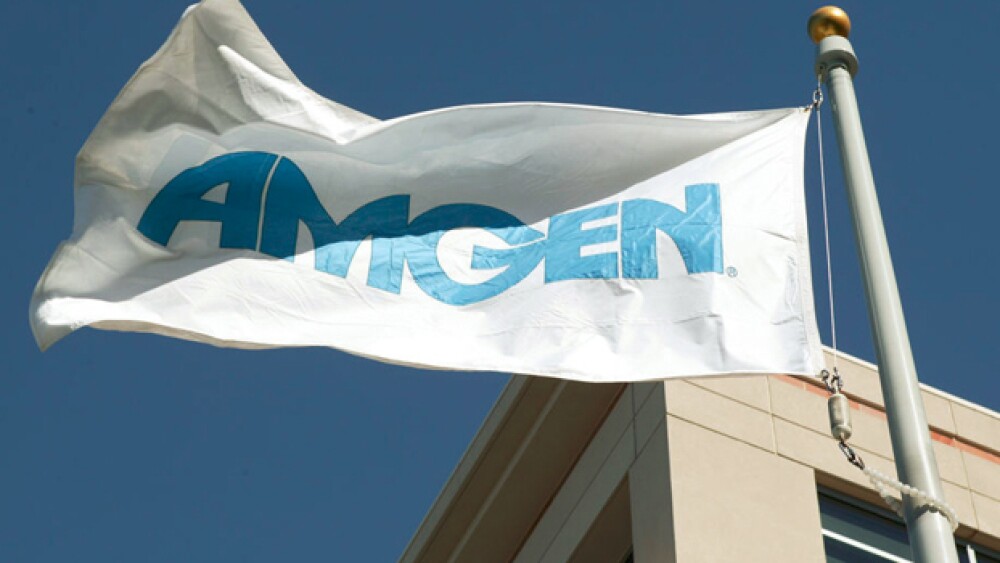Amgen shares dropped 4.2% in pre-market trading at good but not amazing results in an early-stage trial of AMG 510 in in patients with previously treated KRAS G12C-mutated solid tumors.
Amgen shares dropped 4.2% in pre-market trading at good but not amazing results in an early-stage trial of AMG 510 in patients with previously treated KRAS G12C-mutated solid tumors. The company presented the data at the IASLC 2019 World Conference on Lung Cancer (WCLC) hosted by the International Association for the Study of Lung Cancer.
Earlier this year Amgen presented Phase I data at the 55th Annual Meeting of the American Society of Clinical Oncology (ASCO). The new data was a follow-up in a larger cohort of patients. It included a subset of 34 NSCLC patients with 23 being evaluable for efficacy. Thirteen of the patients received the target dose of 960 mg per day, and of them, seven had a partial response at one or more time points and six showed stable disease, which gave a disease control rate of 100%.
“These new data reinforce the earlier positive response rate we shared at ASCO in more non-small cell lung cancer patients receiving AMG 510,” said David M. Reese, executive vice president of Research and Development at Amgen. “We remain enthusiastic about the promise of AMG 510 and continue to rapidly advance its development program both as monotherapy and in combination.”
It’s not completely clear why investors were unhappy with the results, although much of it seems related to very high expectations. Reese said, “If we can expand this and show in a large body of patients that we have response rates on the order of 50% or somewhere near that, that is very clinically relevant and meaningful,” reported Bloomberg. “It’s early days. We need to see if some of these responses will deepen over time.”
Michael Yee, an analyst with Jefferies, wrote in a note to investors that for this patient population, which is very sick, any response rate higher than 35% would be seen as an achievement. “The higher the response, the tougher it is” for rivals such Mirati Therapeutics.
Mirati Therapeutics and Johnson & Johnson are developing competing drugs that are KRAS inhibitors focused on the G12C mutation.
Channing Der, professor at the Lineberger Comprehensive Cancer Center at the University of North Carolina Chapel Hill, and who serves on Mirati’s scientific advisory board, told Bloomberg that the Amgen data are a clear breakthrough. “This tells us we are heading in the right direction and that this concept is the right one. It’s far from saying we are done. The cautious sentiment in the field is that these inhibitors will be successful, but what percent will actually respond to this treatment and for how long is unknown.”
The issue, Der suggests, is patient survival, because many cancer drugs shrink tumors but don’t help patients live longer. “At the end of the day,” he told Bloomberg, “if you don’t get an impact on survival, it’s not considered a success.”
Patients in the Phase I trial were heavily pretreated with at least two or more previous lines of treatment. The primary endpoint was safety and key secondary endpoints included pharmacokinetics, objective response rate (ORR) assessed every six weeks, duration of response (DOR) and progression-free survival (PFS).
The RAS gene family is the most frequently mutated oncogenes found in human cancers. In that family, KRAS is the most common variant and most common in solid tumors. The specific mutations, KRAS G12C, makes up about 13% of non-small cell lung cancers, 3% to 5% of colorectal cancers, and one to two percent of other solid tumors. About 30,000 patients in the U.S. are diagnosed annually with KRAS G12C-driven cancers. This particular mutation has been viewed as “undruggable,” until recently.
Brian Skorney, an analyst with RW Baird, wrote in a note to clients that the data “continue to look strong, if not fully up to lofty hopes.”





